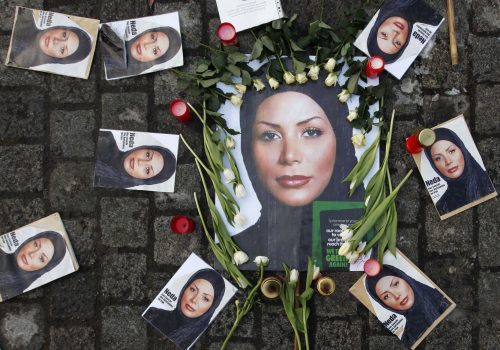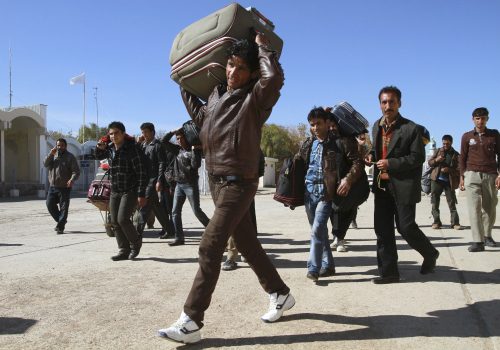Iranian officials’ hypocritical support of #BlackLivesMatter
“The people’s slogan of #ICantBreathe, which can be heard in the massive protests throughout the US, is the heartfelt words of all nations against which the US has committed many atrocities,” tweeted Supreme Leader Ayatollah Ali Khamenei on June 3, capitalizing on what seems to be a moment of validation of the Islamic Republic’s perception of the United States.
The comment thread, however, reverses the accusation with images depicting Iranian prisoners hanging from cranes in public executions: a stark manifestation of how “I can’t breathe” could just as easily be applied to the Iranian people.
Over the past few weeks, Iranian officials have not shied away from condemning the killing of George Floyd, an unarmed African American man, by a police officer in Minneapolis, Minnesota on May 25. The Islamic Republic’s support, however, appears to be not for the African American community in America and the dismantling of a racist system, but rather for the dismantling of the US government itself. On June 7, Ahmad Naderi, a member of parliament, demonstrated this emphasis by asking fellow lawmakers to show their respect for the movement by standing for a moment of silence and then chanting “death to America.”
Officials do not focus on the need for justice in America. They do not focus on support for policy change or reform. They do not take the opportunity to reflect on Iran’s own past and its relationship with racism and treatment of minorities. Instead, they use this moment to fuel their narrative, equating the years of systemic brutality and injustice faced by African Americans, as well as the suppression of protests, with the United States’ actions throughout the world. This movement and its sometimes-violent clashes with police forces functions as the big reveal—the circumstances that finally show the world the United States’ true nature.
Statements call out US atrocities in Afghanistan and Iraq, Palestine and Vietnam, but center on the Trump administration’s “maximum pressure” campaign being waged against Iran since May 2018. Iranian officials draw parallels to their own stances. In a speech to parliament, Mohammad Bagher Nobakht, the head of the Plan and Budget Organization, said, “With sanctions, America has put its knee on the country’s throat.” Similarly, Foreign Minister Mohammad Javad Zarif tweeted on June 1, “The ‘knee-on-neck’ technique is nothing new: Same cabal—who’ve admitted to habitually ‘lie, cheat, steal’—have been employing it on 80M Iranians for 2 yrs, calling it ‘maximum pressure’. It hasn’t brought us to our knees. Nor will it abase African-Americans. #WorldAgainstRacism.” Masoumeh Ebtekar, Vice President on Women and Family Affairs—also known as Sister Mary for her role as a translator and spokesperson during the Iran hostage crisis—wrote on May 31, “All humanity stands with you against racism, against discrimination, against oppression, against imperialism!” Through these parallels to a globally supported movement, Iranian officials are trying to create sympathy and an endorsement of their position.
The support for antiracist marches and calls for the US government to allow its people the freedom to peacefully protest read as a disingenuous diversion tactic. On June 1, Mojtaba Zolnour, head of the parliament’s national security and foreign affairs committee, announced that 230 people were killed in the nationwide November 2019 demonstrations. However, reports from Amnesty International and other organizations say that security forces killed upwards of 300 people, while the State Department claims 1,500 deaths. Critics also point out the regime’s insincerity in support for free speech by mentioning arrests made this past January of those attempting to commemorate the passengers killed in the accidental downing of a Ukrainian International Airlines flight by Iranian missiles. Unlike the recent candlelight vigil for George Floyd, Iranians were not allowed to honor those killed in last year’s protests or in the plane crash. Political activist and former member of parliament Faezeh Hashemi criticized the government’s response, arguing that, while it was necessary for police killings of African Americans and the suppression of protests to be condemned, “it is unbelievable and ridiculous that it is being condemned by those in Iran whose actions are worse than those of the US government.”
“If you were a doctor, you would heal yourself,” she adds, referencing not only to the regime’s hypocrisy on the protection of free speech, but also its treatment of religious and ethnic minorities, such as the legally sanctioned racism towards Afghan migrants and refugees. In recent weeks, violent action toward Afghans in Iran has been strongly criticized after 57 Afghan migrant workers trying to cross into the country on May 1 were forced by guards at gunpoint into the Harirud River, leaving 45 dead. A month later on June 4, tensions increased once more after it was discovered that a car fire in Iran, which led to the deaths of three Afghan refugees, was caused by police officers shooting at the vehicle. Four others were injured in the fire, including a young boy, whose plea, “Give me some water, I am burning” (“کمی_آب_بیار_که_سوختم”) has become a widely utilized hashtag to express anger and dismay over the treatment of Afghans in Iran.
As one anonymous Afghan man who was born in Iran described his experience, “From childhood, I gradually realized that I wasn’t a first-class citizen.” Results of a recent survey carried out by the Iranian Students Polling Agency confirm his experience, with 43 percent of respondents in Tehran supporting a ban on Afghan nationals living in the city, 44 percent wanting Afghan residents to be forced to live in a designated area, and 40 percent supporting school segregation. Afghans are also not legally allowed to leave their city of residence without permission and cannot purchase a house or a car. Critics of the government’s response to the Black Lives Matter protests have called on the regime, as well as all Iranian citizens, to think about racism within themselves and their communities.
“It happened many times that when an Afghan national committed a crime, everyone in the area would treat us badly, as if we’re all criminals,” the anonymous Afghan man wrote. This is a sentiment widely echoed by African Americans describing their experiences in the United States. This reflection of racial struggles within Iran reveals the promise “to wage war against racism” to ring false.
Iranian officials have not spoken out to promote racial justice or free speech. They have spoken out to take advantage of the instability within the United States to distract from their own human rights violations and to attract sympathy and support for their narrative of being the victim of a global tyrant.
Rebecca Stryer is an intern with the Atlantic Council’s Rafik Hariri Center for the Middle East.
Image: A candlelight vigil for George Floyd in Mashhad, Iran. AkharinKhabar.ir


